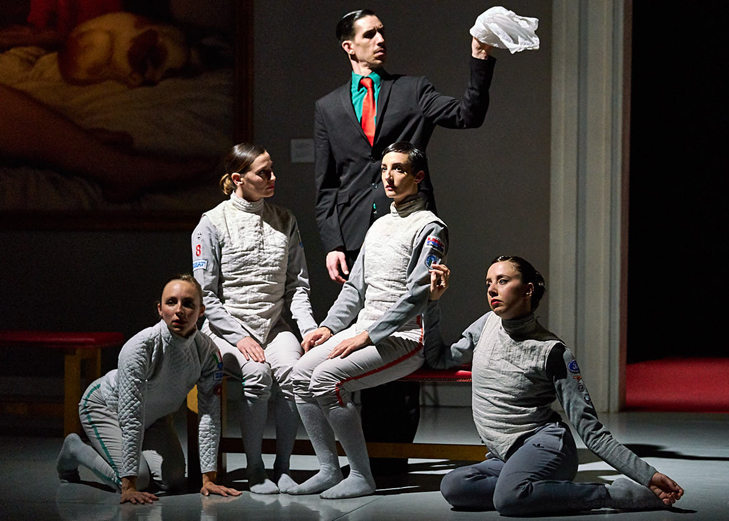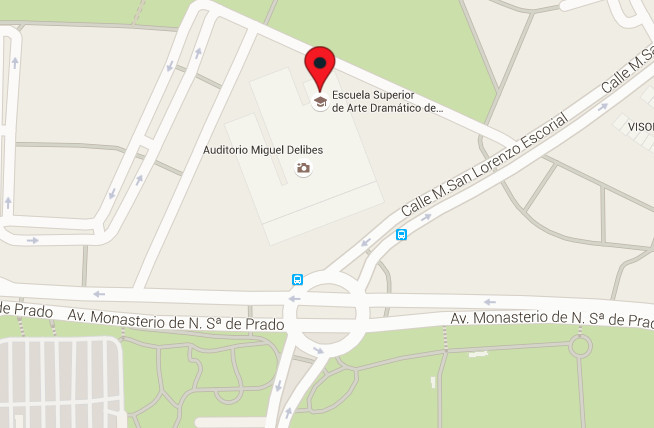In artistic praxis, thought has been relegated to a lower position by the restrictions of the medium and by dominant conventions/trends. Without genuine artistic research which raises questions about reality and penetrates into the unknown, we stagnate in the reproduction of prevailing models. This leads to a proliferation of products in which the mechanisms do not contain or manage the substance, but replace it, giving rise to empty moulds; and at the other extreme, forms that have no clear aesthetic and that do not serve any conscious purpose. In light of the fact that the performing arts ‘spatialise’ thought, and in light of the artist’s ability to construct complex metaphors about reality and transform it, this Masters Degree has among its objectives to rethink the philosophical substrates of the performing arts, to radicalise contemporary artistic creation, to promote the responsibility of the artist in relation to aesthetic and ideological impacts, and to broaden the archetypes of artistic creation, avoiding their gentrification.
-
Thought and Contemporary Society I (4.5 ECTS)
This class addresses some of the big questions about the individual and the universe at the origin of the logos; questions which, reformulated century after century, are still latent in current performance creation. It turns to the voices of the Christian philosophy of platonic inspiration and of modern philosophy to analyse concepts recurrent in the theory of artistic practice related to ‘the territories of the self’, the problem of freedom, evil as a mystery and moral collapse.
Adrián PRADIER (ESADCyL)
Saint Augustine: Philosophical inquiry into the territories of the ‘self’
This seminar aims to promote self-discovery and openness to looking within. It is based on the vital experience of Saint Augustine and on several of his most relevant works, notably Contra los académicos, De Beata Vita, De Ordine, Confessionum and Soliloquia. Saint Augustine, who posits thought as a space of forced transit on the road to happiness, identifies interior space as a unique refuge from the avatars of the outside world, thus constituting the germ of a long philosophical and artistic tradition that has survived to this day through autobiographical writing and self-reference.
Sixto CASTRO (Universidad de Valladolid [UVA])
Leibniz: From evil as a mystery to evil as a problem
It is striking how we have gone from thinking of evil in categories that conceptualise it as something mysterious – and therefore part of a reality in the face of which we can only express astonishment or recoil, or adopt a certain ethical position – to thinking of it as something that has to be explained; that is, as a problem that can be solved if the appropriate perspective is adopted. In this seminar we will read and comment on classic texts about evil and also some passages selected from Leibniz's Theodicy, which will help us delve into the ‘problem of evil’ from the point of view of authoritative contemporary philosophers and theologians.
-
Thought and Contemporary Society II (4.5 ECTS)
Philosophical idealism and dialogue with contemporary thinkers such as Heidegger and Wittgenstein are the starting point for active (and creative) reflection on the idea of performance, cultural phenomena and art (namely, beauty and aesthetic experience). This session also gives importance to a fundamental problem, that of the relationship between language and the world, in order to encourage reflexive autonomy in the student.
Diogo FERRER (University of Coimbra)
Hegel: The philosophy of art, between idealism and contemporaneity
The objective of this seminar is to provide the student with a critical knowledge of fundamental aesthetic concepts through the study of specific artistic cases. The starting point is a definition of aesthetic experience, based on the propositions of Kant and Hegel. The distinction between the beautiful and the pleasant, the characterisation of the beautiful and the sublime, and the characterisation of genius and universality will be discussed. Likewise, reference will be made to the contemporary aesthetic theories of critical theory (Adorno) and of the theory of art as the creation of atmospheres (Böhme). The case studies includes aesthetic problems in relation to the theory of architecture and dance.
José Manuel CHILLÓN (UVA)
Heidegger: Overcoming metaphysical thinking through poetic utterance
Anguish is not always a mental pathology. This has been the thought behind the school of philosophy that started with Kierkegaard and continued through to the existentialism of Sartre and Camus, passing through Heidegger’s revision of phenomenology. Anguish affects our perception of the world, of others and of ourselves, and is responsible for a consciousness at least alternative to that which occurs in the state of non-anguish. This distortion of the logic of reality invites us to place in parentheses all the foundations that have hitherto sustained the individual. The reality to which the anguished person maintains a connection is an opaque reality in terms of a certain way of perceiving, a normal state of consciousness, so it would seem that such an affective disposition is a good gateway to philosophy.
Alberto CONEJERO
Wittgenstein: on the limits of language and the unspeakable
The problem of language and communication has been at the centre of theatrical experience ever since the Theatre of the Absurd. Over and above the plot and the characters, there emerges the question of language: its failures, its limits, its traps. Like a wounded and pursued animal, language has dragged its body and its ghosts across the stage until the present day. We will use Tractatus Logico-Philosophicus and Philosophical Investigations by Ludwig Wittgenstein as springboards to shed light on questions related to how to stage what seems inexpressible, which bodies and which words can speak the unspeakable, what happens when words reach their limits, and how to utter silence without breaking it.
-
Thought and Contemporary Society III (4.5 ECTS)
This class explores the ideas of some of the big names in philosophy in the 20th century (Merleau-Ponty and Foucault, among others) who continue to inspire movements related to subjectivation and resistance, such as the theory of gender. Some of the core ideas (space, time and corporality, the construction of the subject, or self, the place of the other, or otherness …) are inspiring, if not compelling, for current thinking as regards the stage.
Santiago ALBA RICO
Benjamín: The disappearance of bodies
The opposition of being and having corresponds to an earlier stage of capitalism, that of Benjamin’s Arcades Project, in which commerce was still an aim. For many years, however, the social dominion of commerce has implied the disappearance both of things themselves and of their material foundations. The body, opaque and limited, is also a ‘thing’ that, in the same way, has undergone the process of dematerialisation that accompanies mercantile, financial and technological acceleration, with its recomposition of space itself and of the subject/otherness opposition. What is a body? How do we escape it? How do we fall back on it? What relationship does it have with History? Where do events happen to us? This seminar seeks to answer these questions by exploring the contradiction – pointed out by Stephen Jay Gould – between the Darwinian slowness of biological change and the Lamarckian rapidity of cultural change.
Luis UMBELINO (UC)
Merleau-Ponty: From the arts of space to space as art
For Merleau-Ponty, space appears as a form of knowledge and historical meanings. His idea of space-topology is very closely linked to the body. Space exists in relation to a psycho-physical subject; in other words, it is a space experiienced in context. This seminar aims to reflect on the phenomenology of spatiality on the horizon of corporality, the lived spatiality or the space of the body, based on Merleau-Ponty’s Phenomenology of Perception. Together with the principles of perception, we will address forms of construction and cultural appropriation of space (places, locations, lands and territories) and the pairing of memorable spaces and phantasmagorical spaces.
María VELASCO (ESADCyL)
Deleuze: Becoming imperceptible in the act of creation
Some of the followers of Friedrich Nietzsche aim historical criticism directly at Western civilization and at androcentrism, and alert us to ‘the interiorisation of the norm’. Dissident, heterodox and marginalised people seem to be the replacement for superman in the light of works inspired by the genealogical method, such as Madness and Civilisation: A History of Insanity in the Age of Reason and The History of Sexuality by Michel Foucault. Taking as our basis some of the revolutionary ideas of this thinker and the also Nietzschean Gilles Deleuze – who maintains that there is no better reason to write than the shame of being a man, as well as the need to ‘become’ in order to escape the dominant expression – we will look at current trends in thought such as Queer Theory. This theory invites us to think (by means of specific cases of live performance) about the exciting abundance of possibilities provided by the alliance between philosophy and living arts.
 English
English
 Español
Español 





